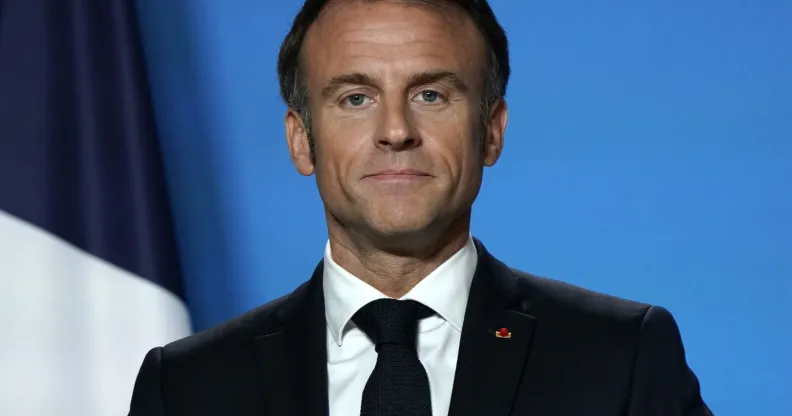Emmanuel Macron backs French ban on gender-inclusive language on state documents

French president Emmanuel Macron. (Getty)
French president Emmanuel Macron has voiced his support for a bill banning gender-inclusive language on official state documents.
During the inauguration of the Cité Internationale de la Langue Française, a cultural and living space entirely dedicated to the French language and French-speaking cultures, on Monday (30 October), Macron said France should not give into what he described as fashionable trends.
“We need to allow our language to live, to draw inspiration from others, to steal words, including from the other side of the world… to continue to invent, but also to keep its foundations, the foundations of its grammar.”
Just hours before a bill seeking to ban gender-affirming language was debated in the senate, Macron reaffirmed his opposition to changing the binary structure of the language.
If passed, the policy would ban the teaching of “inclusive” writing, known as écriture inclusive, which involves writing both masculine and feminine forms of gendered words, separated by dots.
Examples include “président.e.s” (president), sénateur.rice.s (senators), and cher·e·s lecteur·rice·s (dear reader).
“In our language, the masculine acts as the neutral,” Macron said. “There is no need to add dots in the middle of words, or dashes, or anything that makes the text unreadable.”
He argued that the writing style would muddy the language, which “builds the unity of the nation.”
Macron’s wife voices opposition to more than two pronouns
The French senate voted in favour of the proposed legislation, meaning the bill will now be voted on by MPs, who will decide its fate. No date has been announced for the vote.
Socialist Party Senator Yan Chantrel said right-wing officials were “imposing their retrograde and reactionary whims on us”, adding: “Attempts to freeze the language will lead to its death.”
Brigitte Macron, the president’s wife and a former teacher, has long opposed the use of inclusive writing, saying it is a “barbaric use of syntax”.
She also voiced her opposition to pronouns other than the masculine il and the feminine elle, saying: “The language is beautiful and two pronouns are fine.”
Others have argued that inclusive writing makes the language “unreadable” for dyslexic people.
However, the style is “not in and of itself insurmountable, according to dyslexic feminist Géraldine Dubuis, writing on the news website 24 Heures.
“There are more rules to integrate into our language. Moreover, we don’t have any studies on the topic. There is no reason to automatically disqualify inclusive writing just for the benefit of dyslexic people.
“On the other hand, numerous studies have shown that writing in an inclusive manner permits everyone to feel concerned by what is being said.”
How did this story make you feel?

